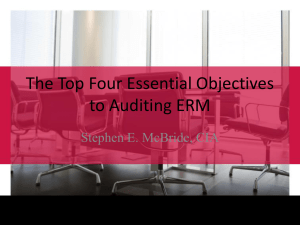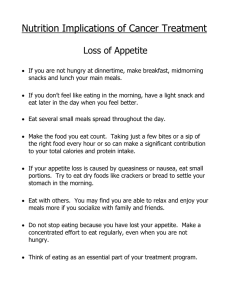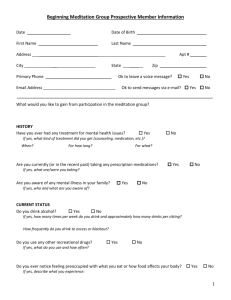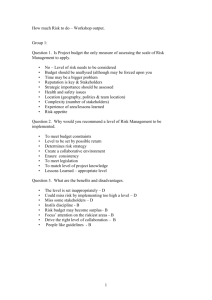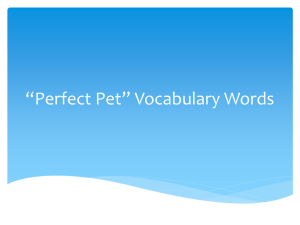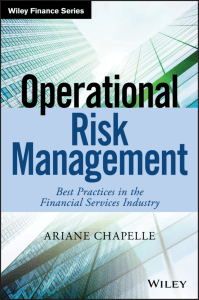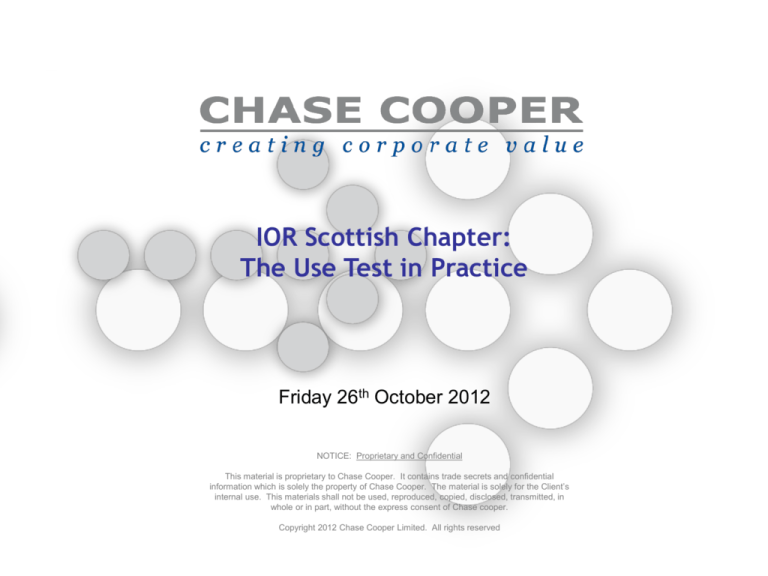
IOR Scottish Chapter:
The Use Test in Practice
Friday 26th October 2012
NOTICE: Proprietary and Confidential
This material is proprietary to Chase Cooper. It contains trade secrets and confidential
information which is solely the property of Chase Cooper. The material is solely for the Client’s
internal use. This materials shall not be used, reproduced, copied, disclosed, transmitted, in
whole or in part, without the express consent of Chase cooper.
Copyright 2012 Chase Cooper Limited. All rights reserved
Agenda
Use Test: What is it – in terms of operational risk?
How are you using your data?
What do the regulators say?
What data have we got already?
How can we use it in the business?
Combining the data for the RC and the Board
2
Use test: What is it?
Showing that the operational risk management
framework is used in the management of the
firm
As well as Governance,
o
o
Is the data used by the business?
Is the business involved in the generation of
the data?
For example, how is operational risk appetite
reported to and discussed by the business?
It is NOT ‘doing the process for the regulators’
3
ORM Framework
Operational Risk Environment
Governance
New activities, processes, products, systems
Indicators
Specify
Identify
key risk & escalation
key control triggers
indicators
Appetite
Risk & Control Assessment
Identify risk &
owner
Assess inherent
& residual risk
Identify control
& owner
Assess design
& performance
Appetite
Scenarios & Modelling
Reporting
Three lines of defence
4
Events
Identify &
capture
internal &
external
events
Analyse
causes:
failing or
missing
controls
Appetite
Reporting: BCBS commentary
Regular reports from both business units and
internal audit
Breaches of risk appetite
Recent significant internal events and losses
Relevant external events
Top level (objectives) review
Compliance with controls
Identification and treatment of non-compliance
Authorisation at appropriate level, if no
treatment
5
Reporting: FSA (additionally)
Results of identification, measurement and
monitoring
Actions taken to control risks
Exposure thresholds and actual exposures
Effectiveness of tools
Board of Directors to receive information
identifying, measuring, managing and
controlling risks of regulatory concern
fair treatment of customers
protection of consumers
confidence in financial system
reduction in financial crime
6
The Use Test (ORIAG paper)
“The effective management of OR depends on
consistent and timely reporting of exposures”
“…imperative that business line managers can
make the connection between the overall view
and what they need to achieve on the ground”
“OR MIS plays the key role in linking senior
management and staff level incentives to deliver
the OR strategy”
7
What RCA data have we got already?
Risks
Likelihood
Impact
Risk owners
Controls
Design
Performance
Control owners
8
VOTE
Do you have this data?
1: Yes
2: No
9
Using the data that we’ve got
Heatmaps
Spidergrams
Min-Max spidergrams
10
Heatmaps: a good place to start
11
Spidergram: High level
Clients
225
200
175
150
Process
Compliance, Legal & Regulatory
125
100
75
50
25
0
People
Financial
Risk
Control
Organisational
IT & Systems
12
Spidergram: IT & Systems
Computer Applications poorly specified
200.0
Systematic approach to IT Strategy
IT dependency on people
Computer Systems not adequately protected
180.0
160.0
140.0
120.0
100.0
Systems and Processes not adequately protected
80.0
60.0
Systems manuals and procedures documentation
Systems and Processes not adequately protected
40.0
20.0
0.0
Training Procedures for IT
Dependency on Technology
Operational threats to IT
Dependency on External Suppliers
Testing of Systems
Legacy systems will not support business
Investment in Technology
Risk
Control
13
VOTE
Do you use:
1: Heatmaps only
2: Spidergrams only
3: Heatmaps and spidergrams
4: Neither
14
What Event data have we got already?
Event
Department of discovery, Department of
origination
Dates event occurred (starting, discovery,
end)
BII loss event type & business line
Losses
Monetary value
15
VOTE
Do you have these data?
1: Yes
2: No
Event
Department of discovery, Department of
origination
Dates event occurred (starting, discovery,
end)
BII loss event type & business line
Losses
Monetary value
16
How good are our preventative controls?
Is there an effective/ineffective department?
17
How good are our detective controls?
Days taken to detect event
Days
30
27
24
21
18
15
12
9
6
3
0
18
VOTE
Do you use Events to challenge:
1: Prevent controls
2: Detect controls
3: Both types
4: Neither
Days taken to detect event
30
27
24
21
18
15
12
9
6
3
0
Days
19
What KRI data have we got already?
Thresholds (green, yellow, red)
Values
Areas data is drawn from
Period of data (e.g. monthly)
Linked risks, controls, actions, events
Event data which can be used as indicator data
20
VOTE
Do you have these data?
1: Yes
2: No
Thresholds (green, yellow, red)
Values
Areas data is drawn from
Period of data (e.g. monthly)
21
KRI Dashboard
22
VOTE
Do you have a KRI dashboard?
1: Yes 60%
2: No 40%
23
Linking KRIs to Risks
24
VOTE
Have you linked KRIs to risks?
1: Yes
2: No
Thresholds (green, yellow, red)
Values
Areas data is drawn from
Period of data (e.g. monthly)
Linked risks, controls, actions, events
Event data which can be used as indicator data
25
The RED Report: Red risks with
Red KRIs with Overdue Actions
26
Risk Performance
Current Level
Performance
Appetite
Overall
Risk Event
Impact
Prob.
Actual KRI
Trend
Target KRI
Better /
(Worse)
Actions /
Summary
Major Technology
Infrastructure Failure
H
L
No. of weeks
free from
severity 1
Failure = 7
+3
10 free weeks
during year
+3
No action
required
Breach of confidentiality
M
M
Complaints
received
from
Customers re
alleged
breach = 0
0
Zero material
breaches of VIP
customers’ /
major corporate
customers’
confidentiality
0
High
potential for
risk
occurrence
due to
customer /
client base
Employee processing
error
L
M
Error
reporting:
-5 events
-£4,000 loss
+2
+1000
No more than 10
errors per quarter.
No single event >
£10,000
+5
No action
required
Internal Fraud
M
H
No. of frauds
over £10,000
Detected: 7
No. of these
frauds
committed: 4
Potential
Loss:
$300,000
Actual Loss:
£65,000
+2
+2
+50000
Not more than 1 a
month
£10,000
acceptable
(6)
Action
required,
retrain staff,
redesign
processes
Rating*
.
*Chair of the Committee decides on overall rating for each risk event
27
Top risks and their KRIs
28
ORM Framework
Operational Risk Environment
Governance
New activities, processes, products, systems
Indicators
Specify
Identify
key risk & escalation
key control triggers
indicators
Appetite
Risk & Control Assessment
Identify risk &
owner
Assess inherent
& residual risk
Identify control
& owner
Assess design
& performance
Appetite
Scenarios & Modelling
Reporting
Three lines of defence
29
Events
Identify &
capture
internal &
external
events
Analyse
causes:
failing or
missing
controls
Appetite
Contact details
Tony Blunden
Head of Consulting, Chase Cooper
Hon Professor, Glasgow Caledonian University
Tel:
+44 (0) 207 377 2269
Fax:
+44 (0) 207 426 0882
Mob:
+44 (0) 770 325 7480
E-mail: tony.blunden@chasecooper.com
www.chasecooper.com
30

